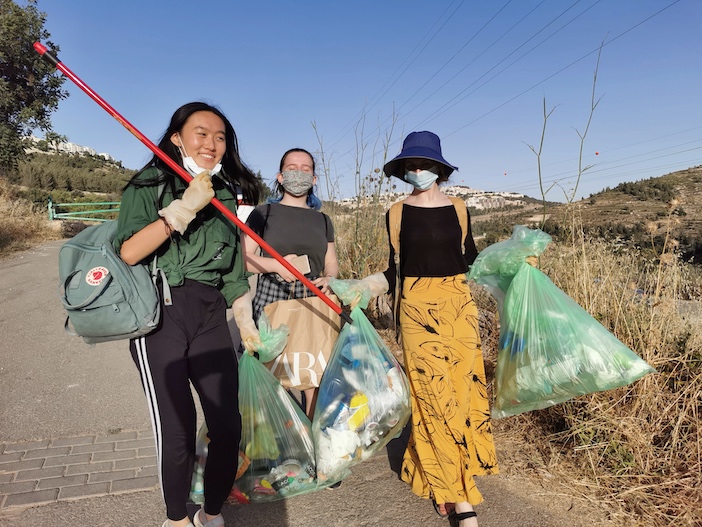As we all know, climate change is just around the corner, and the factors contributing to this apocalypse are endless. Oil spills, air pollution, overfishing… you name it. But there’s one small thing that is often overlooked in this big discussion: littering. Whether you left behind that empty Coke can on purpose or not, its impact on the environment is not as minor as you might think.
While currently stranded abroad, in the past two months, a group of friends and I have initiated a program where residents in our city of Jerusalem are invited to volunteer and collect garbage with us. It started when we were hanging out and couldn’t help but notice that the flower pots in my neighborhood were bombarded with trash. From there, we first cleaned out the surroundings of a local high school, with some passing students eagerly joining us. Since then, we’ve been hosting weekly cleanups and our group is nearing 40 participants.

The trash picking group pose with their day’s haul
Two weeks back, we went to a popular spring called Ein Lavan in the Jerusalem hills. The ground was covered in empty beer bottles, there were items of torn clothing in the bushes, and masks were dangling off tree branches. Another time we rummaged through the shores of the Yarkon River and found there were more styrofoam crumbs than soil. Countless pieces of litter collected at the port and were washed up against the river banks. Full-time sanitation workers that we talked to expressed that was too much to handle, and sought all the help they could get.
Many people have asked me why I’m doing this here while abroad when it’s not my country. And to that I say, it’s not my country but it’s my planet. The same goes for anyone in Beijing willing to make a difference, it doesn’t matter if you’re a local or not, it’s not enough to just not litter. It’s also our duty to ensure that others follow suit.

“It’s not my country but it’s my planet”
In Beijing, we often rely on workers in bright orange suits and signature bamboo broomsticks to clean up after us, and we push the responsibility for keeping the city clean to them. It’s become such a big part of our culture in China that even something as simple as going to your local McDonald’s, people just get up and walk away from their trash when they’re done eating, expect the staff to throw it in bins mere meters away. But the overflowing garbage in hutongs, near tourism sites, and particularly in the countryside proves that our trash production is outweighing their cleanup capabilities. Sweeping up the fallen ginkgo leaves is already a heavy enough workload.
While on weekend outings with the family, I’m sure you’ve noticed areas on the way to the Great Wall or the Xiangshan Park, where the city meets the country, that are uncared for and unattended to by workers. Here, you can easily see the bits and pieces of garbage left behind by visiting tourists. Plastic wrappers and empty bottles are not biodegradable, and once scattered in nature, they will cause great harm to the plants and natural habitat.
It’s time we lend a helping hand. I urge you to gather up a group of friends and head to your favorite spot in town. This could be a shopping center, a park, or a rural street on the outskirts of Beijing. Then split up the area and work together. I guarantee you, afterward, the feeling of accomplishment will be overwhelming. And as a bonus, think about all the great exercise you’re adding to your day.
Now you must be thinking, but we’re in the middle of a global pandemic! What if we come across masks and gloves? Do we pick it up or leave it? You can purchase a simple trash picker on Taobao for a couple of RMB or wear rubber gloves and sanitize them immediately after. Always bring hand sanitizer and disinfectant wipes in your pocket and use sticks to pry loose garbage trapped in bushes.
KEEP READING: Cleaning up Historical Beijing With the CLUP Club
Photos: Qinglan Du



